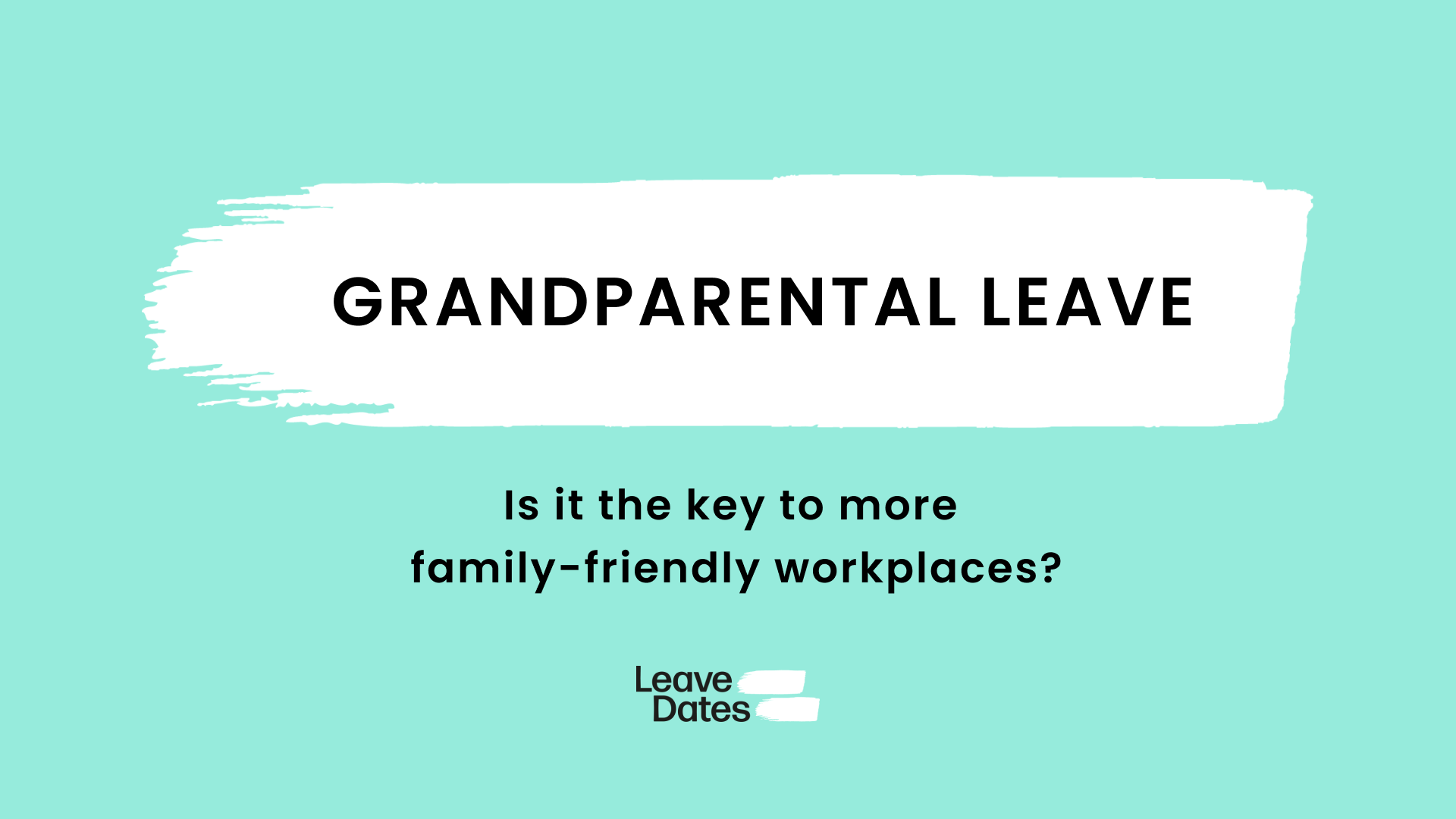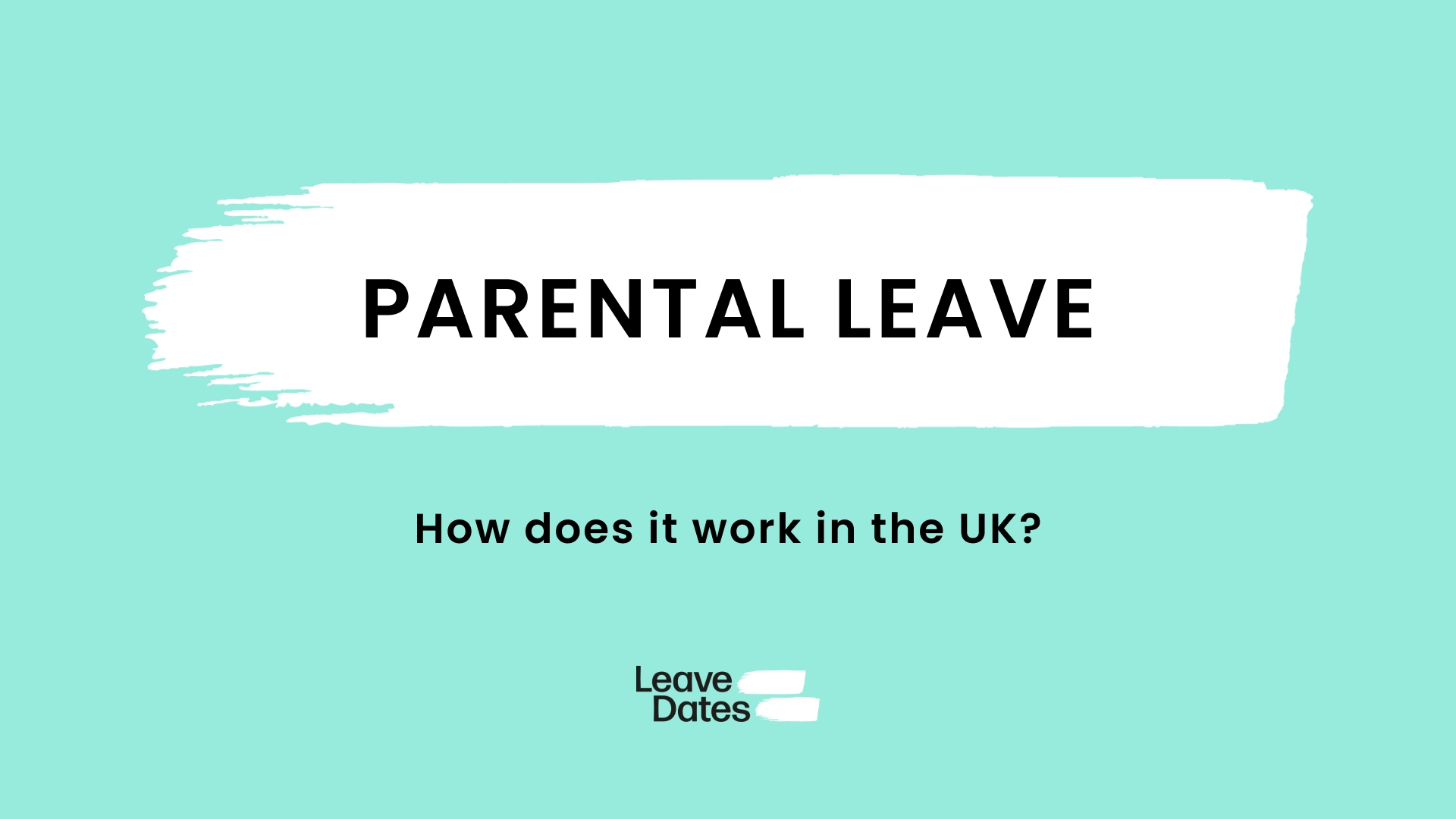
In the ever-evolving and always challenging landscape of work and family life, and with changing priorities driven by societal shifts, the concept of grandparental leave is emerging. This new category of leave could be an important contributor to creating family-friendly workplaces in the UK.
Table of contents
- What is Grandparental Leave?
- Where has this idea come from?
- Working Grandparents
- History of Grandparental Leave
- Economic Benefits
- Health Benefits for Grandparents
- Benefits to the child and family dynamics
- Conclusion
Childcare costs are creeping up, while salaries remain stubbornly low. Cash-strapped parents – and especially single parents – are turning towards every kid’s favourite people, cake-givers extraordinaire: the grandparents.
Luckily, with morbidity and mortality in older adults declining in developed countries, grandparents have more healthy years with their grandchildren than ever before. Plus, there’s usually more than one of them - on average, a child has three or four living grandparents through childhood.
What is Grandparental Leave?
Grandparental leave’, a term gaining in prominence, refers to the provision of leave for grandparents to actively participate in the care, support and upbringing of their grandchildren.
This extension of traditional parental leave policies reflects the evolution of family dynamics in the contemporary economic and social context, where grandparents are becoming an increasingly important player in caregiving, moving from a supportive to an essential role for many families.
Where has this idea come from?
Involvement of grandparents and the wider family in childcare didn’t used to be unusual, but as society changed and capitalism gained pace, we were all setting up LinkedIn profiles at age 5 and into full-time work by 9 (okay, maybe that’s a slight exaggeration).
As a result, we moved towards paid childcare as the way to keep airborne the many, many plates modern parents have been trying to juggle. But then things got expensive – too expensive.
As the cost of living starts to bite and Brits are looking for ways to save, for many the nursery bill is the one they’d most like to take sledgehammer to.
Over the years, this has crept up to the level that it’s now often similar in size (or bigger) than the mortgage, which would normally be a family’s biggest outgoing. And God help you if you’ve got more than one kid. This has caused many to turn back to more traditional sources of childcare – extended family, chiefly grandparents. But now there’s a problem there too.
Working grandparents
Due to higher life expectancy and correspondingly higher retirement/pension ages, as well as the ever-present shadow that is the cost of living crisis, many people are becoming grandparents while they’re still working.
The average age that a person becomes a grandparent in the UK is 63, whereas the average retirement age is around 65 – though in London, many expect to still be working into their 70s.
Retirement ages are also expected to increase in light of the shift towards more flexible working and working from home that we’ve seen post-Covid-19, which could enable older workers to remain in the workforce for longer.
You cannot claim a state pension until age 66, or 68 for those born after April 1978.
So for a lot of people, there’s likely to be at least some overlap between their working life and their life as a grandparent.
Ultimately, retirement age is determined by pension size – the younger you retire, the bigger the pension pot you need to sustain yourself in your post-income-earning years.
Many of the younger generation do not have the pension plans that their parents had, and so may be forced to retire much later, meaning the issue of grandparental leave is only likely to become more relevant.
History and where are we now?
Fortunately, if we’ve learned anything from the pandemic and post-pandemic years, it’s that workplaces and employers can be much, much more adaptable and flexible – if they want to be.
At the same time, perspective shifts on work-life are undergoing a profound transformation. The recognition that employees are not just workers but people with multifaceted interests, roles and responsibilities, has prompted a re-evaluation of workplace policies, recognising the need to accommodate the diverse aspects of individuals’ lives, including any caregiving responsibilities.
The concept of grandparent leave has gained attention in the UK as a potential policy to support families. While there is no legal requirement yet, many employers recognise the benefits of implementing such policies to provide flexibility for working grandparents.
In 2024, Sweden passed first-of-a-kind laws that allow grandparents access to leave in the first year of the child's life. Under the new law, grandparents can be transferred up to 45 days of leave, but it goes even further for supporting single parents who can transfer up to 90 days.
Indeed, the UK Government was considering extending shared parental leave (SPL) to include grandparents, with then-Chancellor George Osborne recognising that “grandparents play a central role in caring for their grandchildren and helping to keep down the costs of childcare,” but that, “Increasing numbers of grandparents, however, also want to remain in work themselves.”
The plans were shelved in 2018, in the context of a wider re-thinking of the SPL policy, and there is currently no legal entitlement to grandparental leave in the UK. This means that all childcare must be covered through maternity/paternity or shared parental leave, and then childcare providers, creating huge barriers to work for parents.
However, while concrete plans are on the back burner for now, the fact that the dialogue around grandparental leave is happening shows that there is acknowledgement at the government level of the need for a system that enables grandparents to provide this much-needed support. Ideally, this should not simply shift the financial burden for childcare away from their adult children and onto themselves.
Of course, the situation is not clear cut, with various advantages and disadvantages, and the constantly evolving work and economic landscape make it hard to conduct a clear cost-benefit analysis of the case for grandparental leave.
However, we’re generally of the opinion that more flexibility in who can take leave, for what purpose, when and how, can only be a good thing for workers of all genders and right across the age spectrum.
Economic Benefits
Amidst a hugely challenging economic time, the need for comprehensive family support, particularly regarding childcare, has become more pronounced. The exceptionally high cost of nursery places, often surpassing average earnings after tax and other deductions, creates a paradox where individuals – mainly women – are effectively paying to work.
This economic conundrum challenges the financial feasibility of employment for many and underscores the critical role grandparents can and do play in providing essential childcare support.
However, the cost of living crisis is affecting people of all ages, not only parents of young children, which complicates the issue somewhat. While on one hand, it increases the need for grandparental support to ease the financial burden of childcare, with many parents taking second jobs or increasing their hours to supplement their household income; on the other, it is forcing many older people to stay in work for longer than they would like, or indeed to return to work after retirement.
This makes it much harder for them to offer this support without risking financial difficulty themselves, a pressing concern as retirement approaches.
Providing a formal policy and system for taking grandparental leave would contribute to resolving this conflict, and an employer who offered this would be particularly attractive to those considering taking a job or staying in work for longer.
This may have benefits in terms of employee retention and maintaining a diverse workforce, enabling employers to tap into the wealth of experience and wisdom possessed by the older generation. It would allow older people to continue working and making pension contributions for their later years without missing out on precious time with their grandchildren or feeling unable to offer much-needed support to their own children in a challenging economic time.
Health Benefits for Grandparents
In addition, and moving away from financial and economic considerations, studies have shown that there are significant health benefits, both physical and mental, for grandparents who look after their young grandchildren, including increased longevity.
Several studies have identified a positive link between care of grandchildren and better physical health.
In providing an important bridge to social engagement, contact and activities, caring for grandchildren “can be protective and associated with lower risk of dementia.”
In the same way that annual leave and sick leave contribute to overall greater wellbeing and productivity of workers by enabling them to take time to focus on their health and hobbies, so too might grandparental leave increase health and wellbeing of older workers and enable them to stay physically and cognitively fit for longer.
In terms of mental health, time spent with family will of course lessen the risk of depression and loneliness among older people, which are major concerns.
Working and spending time with family provides valuable opportunities to connect with others, so a system of grandparental leave that allows people to do both would contribute hugely to maintaining essential social networks amongst the older population.
Bereavement and compassionate leave for grandparents
In addition to grandparental leave, bereavement leave for grandparents is another important consideration for workplaces striving to create supportive environments in times of tragedy. Similarly, compassionate leave is important for grandparents in an emergency as they often share care responsibilities within their families.
These types of leave recognise the emotional toll and familial responsibilities that grandparents face in the unthinkable happens to a young family member.
Benefits to the child and family dynamics
As well as potentially extending the lifespans and improving the quality of life of grandparents, the closer family bonds nurtured through these kinds of care arrangements have emotional and developmental benefits for the children being looked after, too.
Being nurtured by a grandparent is a unique and enriching experience for a child, offering them an early opportunity and safe environment in which to form a relationship and build an attachment to someone other than a parent.
The intergenerational nature of that connection provides children with a broader perspective on life and a sense of identity rooted in their family history, helping to build emotional resilience.
There is a strong argument that grandparental leave for the purpose of supporting parents with childcare contributes to enhanced family wellbeing across the board.
It allows parents to reap greater financial benefits from working, whilst knowing that they have a trusted and reliable source of childcare, reducing stress at home.
For the child, they receive focused, one-on-one attention from someone who knows and loves them and will be a consistent presence in their lives.
And for the grandparents themselves, they find enjoyment, fulfilment and a role in family life where there could otherwise be a risk of feeling lonely or sidelined, with all of the mental and physical health benefits that come alongside this.
For family dynamics more broadly, it helps create a ‘circle of care’ and breeds familism, where wider family members rely on each other for various forms of support throughout life.

Conclusion
We think there is a clear case regarding the value of and need for grandparental leave policy in the UK, but implementing it in a meaningful and fair way will require legislative changes as well as enthusiasm and advocacy on the part of employers.
Employee and employer perspectives must be considered, and there will be hurdles to overcome as the nature of work, society and family structures no doubt continue to evolve.
The emergence of grandparental leave as a solution to the high cost of childcare and living in the UK perhaps signifies a departure from the highly individualistic lifestyle and politics that have come to characterise contemporary capitalist societies.
Arguably, this shift reflects a re-evaluation of familial structures, echoing a return to the closer intergenerational ties prevalent in pre-industrial Britain and still the norm in many parts of the world. It also makes economic sense, with the increased flexibility enabling more people (parents and grandparents) to be economically active.
One thing is abundantly clear: with such a large and diverse population, having complex and changing needs, the more options there are when it comes to childcare, the better.
By providing a framework for grandparents to take leave to provide childcare support when needed, the country as a whole can benefit from an overall larger workforce as well as strengthened familial bonds through fostering intergenerational connections.



